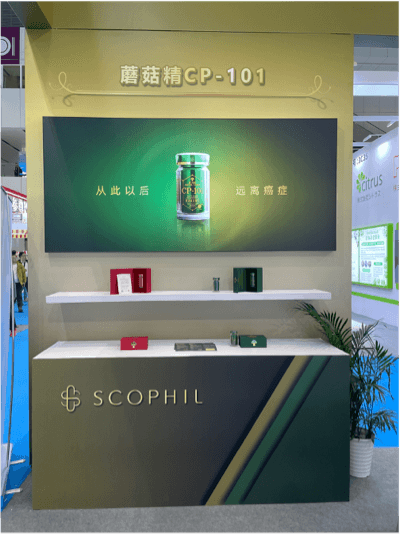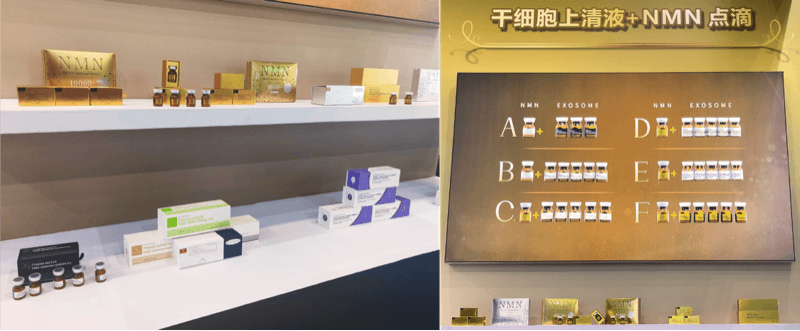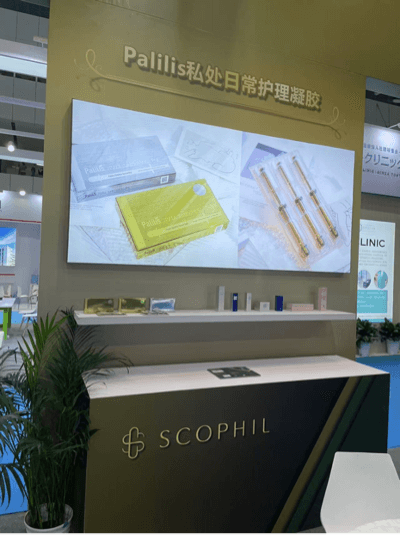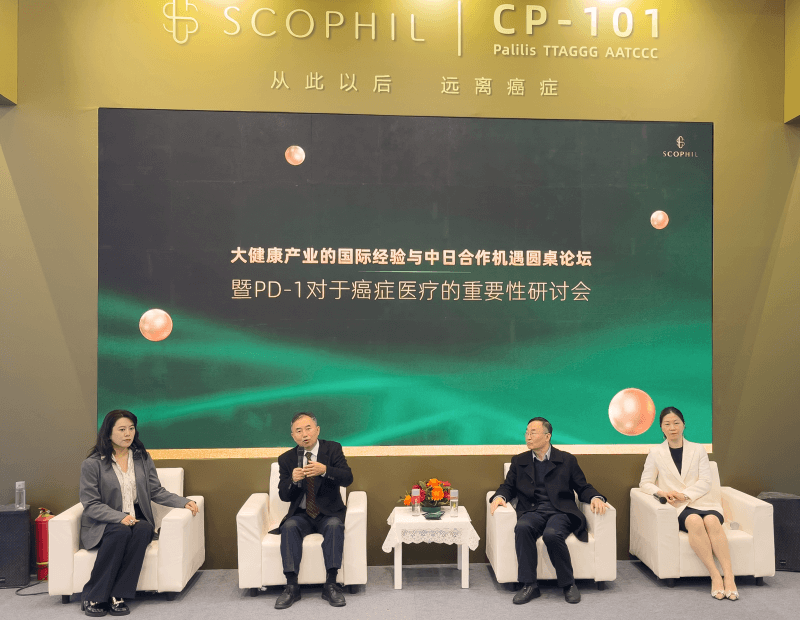On December 12, amid industry anticipation and attention, Japan's SCOPHIL Regenerative Medicine Group, a global leader in life health and anti-aging, made a grand appearance at the HNC Shenzhen International Nutrition and Health Industry Exhibition, instantly igniting the atmosphere and attracting numerous industry professionals.

SCOPHIL's Cutting-edge Products Ignite the Exhibition
Entering the SCOPHIL brand booth was like stepping into a life health hall filled with technology and professionalism. The first thing that caught the eye was the group's "black technology" new product for cancer treatment — Mushroom Extract CP-101, quietly displayed in the showcase but emanating a powerful presence that could change the landscape of cancer treatment.
CP-101 is a natural anti-cancer component jointly developed by Japan's Iwade Institute of Mycology and Mie University, derived from water-soluble extracts of Agaricus blazei. CP-101 works by interfering with the PD-1/PD-L1 immune escape mechanism, activating T-cell immune responses, and restoring the immune system's surveillance and clearance functions for tumors, representing an important immunotherapy strategy.
Meanwhile, CP-101's composition is rich in natural extracts of high medicinal value such as Coprinus comatus and Hericium erinaceus, showing significant effects on human immune regulation, gut health, antioxidant and anti-inflammatory properties, neuroprotection, and overall health. It can be used for preventive medicine and daily health maintenance, helping to alleviate treatment side effects and reduce patient treatment reactions. Professional visitors came in an endless stream, all eager to learn about cutting-edge cancer treatment solutions, crowding the booth.

Adjacent to it was the group's globally popular anti-aging product line: stem cell supernatant, NAD+, and NMN products, which act like "time reversers," carrying the mission of delaying aging and rejuvenating vitality. Visitors listened with great interest to the R&D stories behind the products, engaging with professional explainers for detailed product efficacy information, delving into the technical mysteries behind the products, their eyes full of admiration for the technology and longing for youth.

The Palilis private care product in the women's health field, with its strict craftsmanship and innovative concepts, redefined new standards for women's private care, attracting numerous consumers and industry practitioners to stop and discuss potential cooperation. Especially after learning that the Palilis private care series is SCOPHIL's star product developed over six years, and that it is Japan's first company to successfully develop and patent mucosal absorption technology for women's private care, establishing new standards for women's health, the on-site representatives were full of praise, with inquiries coming one after another.

Experts Gather to Build a Communication Platform
The guest lineup for this roundtable discussion was truly "luxurious," with invited experts covering renowned domestic medical experts and frontier scholars from research institutions. They held the latest research achievements in life sciences, the development status of new cancer treatment drugs and technologies, analyzed industry trends from academic fundamentals, and shared Sino-Japanese exchange and cooperation experiences in life health and cancer fields based on their professional experience.
Senior representatives from health management were also present, leveraging massive market data and keen insights to accurately interpret capital flows, market growth rates, and potential opportunities, capturing the latest research needs. The director of the Japanese Cancer Mutual Aid Research Charity Foundation, bringing the foundation's mutual aid philosophy, shared the principles of CP-101 and PD-L1 blocking mechanisms, recounted CP-101's development experience and end-market feedback, and shared practical details of product implementation.
Experts from multiple fields gathered, with different perspectives complementing each other, ensuring the seminar output had both theoretical height to guide future industry direction and practical guidelines to facilitate close Sino-Japanese cooperation in life health and cancer fields.

In the discussion of PD-1's importance in cancer treatment, Mr. Wen Huiqing, a renowned domestic medical expert and director of hepatobiliary surgery at the Fifth Affiliated Hospital of Southern Medical University, held the microphone with focused attention, explaining in simple terms with detailed clinical cases. The application of PD-1 immune checkpoint inhibitors in hepatobiliary surgery has brought new hope for liver cancer and bile duct cancer, which have poor prognosis and limited traditional treatment methods, gradually reshaping the diagnosis and treatment ecology of hepatobiliary diseases, showing remarkable clinical value and application prospects.
Ms. Xie Meng, director of the Japanese Cancer Mutual Aid Research Charity Foundation, cited extensively, sharing Japan's advanced experience in PD-1 drug development and clinical application. In 2018, Professor Tasuku Honjo of Japan won the Nobel Prize in Physiology or Medicine for "discovering negative immune regulation therapy for cancer," which caused a strong response in Japan, and this research achievement opened new pathways for cancer treatment in Japan. SCOPHIL's Mushroom Extract CP-101 is a new crystallization of cancer research born under the PD-1 development principle. CP-101 works by interfering with the PD-1/PD-L1 immune escape mechanism, activating T-cell immune responses, and restoring the immune system's surveillance and clearance functions for tumors, representing an important immunotherapy strategy.
When discussing international experience in the health industry and Sino-Japanese cooperation opportunities, the atmosphere became even more heated. Professor Ding Mingyue, professor and doctoral supervisor at the School of Life Science and Technology of Huazhong University of Science and Technology, reviewed his decades of experience in cooperating with life health industry projects from various countries worldwide, elaborated on the complementary advantages of China and Japan in their respective fields of life health and cancer treatment, and looked forward to infinite possibilities of joint creation. Ms. Yan Wei, a renowned representative in the health management field, shared numerous ideas for international cooperation based on her professional experience, expressed gratitude to SCOPHIL for providing such an open platform for industry representatives to discuss, and looked forward to project cooperation with SCOPHIL and more international quality enterprises.
As the organizer of the roundtable discussion, Japan's SCOPHIL Regenerative Medicine Group has been dedicated to life health product development, production, and promotion for many years, achieving remarkable results. Its multiple product lines, including anti-aging and women's health series, have established a firm foothold in the global market, relying on continuous R&D investment, strict product quality control, and advanced personalized service concepts.
In recent years, SCOPHIL has focused on human serious diseases, addressing cancer prevention and treatment needs, collaborating with Japan's Iwade Institute of Mycology and Mie University to develop the natural anti-cancer component CP-101. This is a water-soluble component extracted from Agaricus blazei, with immune-boosting and excellent antioxidant properties, mainly used for preventive medicine and daily health maintenance.
This seminar was SCOPHIL's way of giving back to the industry, leveraging its deep industry resources and organizational capabilities to build a dialogue platform; it was also an opportunity for corporate self-renewal and keeping up with frontier needs, drawing inspiration from expert exchanges to feed back into subsequent product line expansion and technology upgrades, demonstrating its determination to lead the industry towards higher quality development.